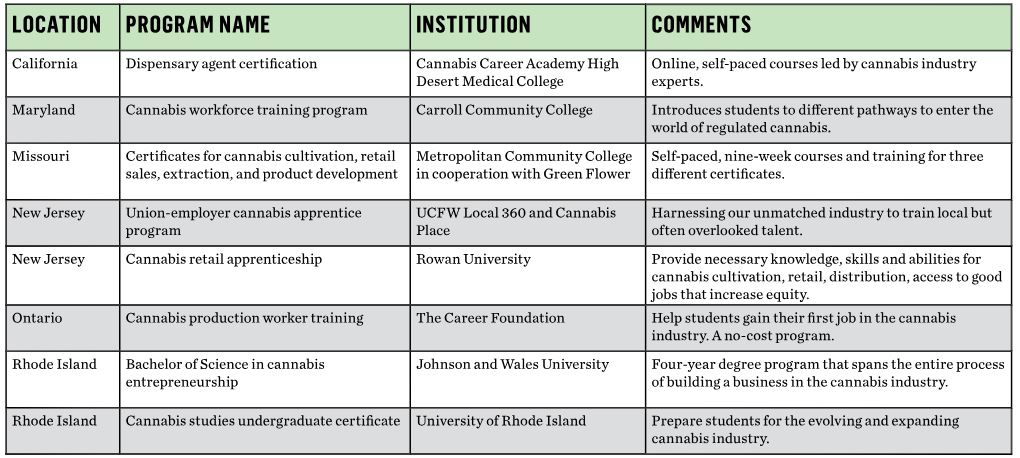The nascent legal cannabis industry incorporates technology at every stage of production. Growing the product, processing the product, and marketing the product all require complex technology. Today, the technology used to produce high-quality cannabis means that there is a high demand for skilled professionals who can construct and maintain the physical and biological support systems required for commercial-scale grows. The cannabis industry is generating about 300 new jobs per day, or nearly 110,000 new jobs per year.
Skilled vocational careers almost always require people to have some kind of training and education after they graduate high school. A modern, commercial-scale cannabis production operation involves diverse elements of plant and soil science, agriculture, biochemistry, tissue culture, genetics, and computer science. These are just a few areas of technology that are essential to the cannabis industry. There are also huge physical structures with complex plumbing, electrical and environmental control systems needed to grow weed. This infrastructure must be maintained by skilled people after being constructed by skilled people.
This is the fourth article in a series on social justice and the cannabis industry for Motif. The term social justice means different things to different people. To me, it means: Justice in relation to a fair balance in the distribution of wealth, opportunities, and privileges in a culture where individuals’ rights are recognized and protected. The concept of opportunity is central to social justice.
Education and training opportunities, especially for high school graduates are — in my view — a key element of social justice in our society. Americans spend trillions of dollars to attend institutes of higher education because of the promise of massive economic and cultural returns. I consider the term “higher education” from a simple mindset that includes any sort of academic or vocational education for people after high school. Higher education is education and training after high school.
The legal cannabis industry and the world of higher education did not take long to find each other. A recent article by Nadir Pearson lists “One-hundred twenty of the best college courses, degrees and certifications for cannabis.” From the data presented by Mr. Pearson, I tallied a total of 93 higher education degrees or certificates related to elements of cannabis production, cannabis processing, and cannabis marketing. There are 65 certificates of documented higher education coursework and training for virtually all aspects of cannabis production and marketing. These certificates document that a student has completed a specific class and/or laboratory training, and has competency with aspects of technology required for growing, processing, as well as product development and marketing of cannabis. The certificates are offered by community colleges as well as universities.
The accompanying table provides a snapshot of some selected cannabis training and education programs in the United States and Canada.
Certificates of cannabis competency are often administered in cooperative partnerships between higher education institutions, state agencies, and nonprofit organizations, as noted in the table of selected higher education cannabis programs. An organized labor union is also involved with such partnerships.
When it comes to college degrees that focus on cannabis as a major field of study, there are at least 13 associate degrees (two years of study), nine bachelor’s degrees (four years of study), and six master’s degrees (usually two more years of study after completing a bachelor’s), available in the United States and Canada. Colleges and universities also offer additional stand-alone cannabis courses and a secondary emphasis on cannabis as a minor field of study.
In Rhode Island, Johnson and Wales University offers a four-year bachelor of science cannabis degree and the University of Rhode Island has a cannabis certification program, as noted in the table.
It is impressive to see the extent to which the cannabis industry has become connected with higher education, especially when it comes to vocational education and training. In the accompanying table, it is encouraging to see summary comments of main points from program websites that use language to emphasize positive aspects of the relationship between the cannabis industry and higher education such as access to good jobs, increase in equity, a no-cost program, harnessing our unmatched cannabis industry, spans the process of building a business in the cannabis industry and so on.
Since the COVID pandemic began, the number of students in higher education has declined by more than a million people. More institutions of higher education are competing for fewer students by any estimate.
Fortunately, higher education and training opportunities for well-paying jobs in the cannabis industry have grown quickly and will continue to increase as the industry matures. Providing people with education and training opportunities to make a good living in the cannabis industry has strong potential to improve social equity and social justice.
